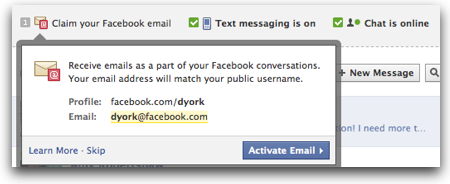Over the weekend, I had a severe case of deja vu… and found myself humming that song from Styx that includes the line “Haven’t we been here before…“.
Why?
Because Facebook followed through on its earlier statement around letting people receive email to a “facebook.com” email address:

So yes, indeed, because clearly I need more email addresses, you can now send me email to:
[On a side note, I will be very curious to see what kind of anti-spam measures Facebook puts in place as these addresses get out there. Consider this my little test… putting that email address out here on a public blog site where it can be easily scraped.]
The deja vu part is that … we’ve been here before. Remember AOL? CompuServer? Prodigy? Delphi? MCI Mail? GENIE?
Remember all those “walled gardens” of the original “computer information services”?
And remember those glorious days when you could FINALLY get an email address so that you could send and receive to people outside the walls of whatever service you used? (Even if those addresses were sometimes hard to write or remember? ex. CompuServe’s numerical addresses.)
While I realize that some % of readers of this post in 2011 were probably not born in the heydey of those services, for those of us who were around those were big days when we finally got those email addresses.
Soon everyone had an open Internet email address… the walls came down… and communication happened across all services.
Over time, though, the walls started coming back up. I wrote about this four years ago in a May 2007 post, “Facebook, MySpace, Twitter and the Return of the Walled Gardens of E-Mail” and drew my view of the evolution of email:

[Another side note: Notice how things change in 4 years and some of the services I mentioned on the right that are no longer around or relevant…]
And so now we Facebook giving us a way to receive email messages. We’ve had the ability to send email messages out of Facebook for some time now, but it was sent from cryptic, ugly addresses that changed. Now we have a “regular” email address… and indeed an outbound message from Facebook to my “dyork@voxeo.com” address looks fine in my regular email client:

Note, of course, that since Facebook does not let you set a “Subject” line on an outbound message you create, the subject is simply “Conversation with Dan York”.
When a message is initially received from the outside, the subject line of that email is preserved, as you can see here:

The “Hidden Text” in this case was my normal Voxeo email signature.
All in all it works quite well. I’m not naive enough to think that this is some great idea by Facebook to open up to the outside world… the simple fact is that they want to keep you inside of Facebook where you interact with people on Facebook… and, oh, yes, view all the advertising.
If Facebook can convince you to use the site as your email portal, instead of, oh, GMail, then Facebook and their advertisers win against Google and its advertisers.
Of course, Facebook still has its incredibly onerous Terms of Service that basically says all your email – and any other content – belong to Facebook… so I don’t see me personally using my “dyork@facebook.com” email account all that often outside of the regular FB messaging I’ll be doing there.
Still, all cynicism and deja vu aside, as an advocate for the open Internet I am pleased to see this move by Facebook. Some people have made Facebook their portal of choice… and this now lets people choose other sites as their portals of choice, yet still communicate with Facebook users.
In the end, this openness – and ability for us to control our choice of communication – is exactly what we need.
Have you “claimed” your Facebook email address yet? Will you use it?
If you found this post interesting or useful, please consider either:
- following me on Twitter;
- adding me to a circle on Google+;
- subscribing to my email newsletter; or
- subscribing to the RSS feed.